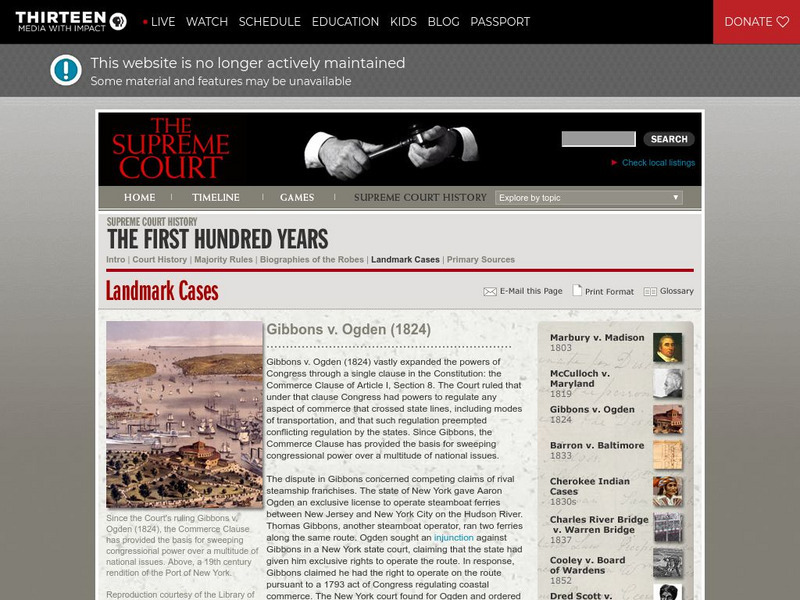PBS
Wnet: Thirteen: The Supreme Court: Landmark Cases: Mc Culloch v. Maryland (1819)
PBS gives an explanation of the Supreme Court case of McCulloch v. Maryland that established a broad interpretation of the powers of the federal government. Opinion delivered by Chief Justice John Marshall.
PBS
Wnet: Thirteen: The Supreme Court: Landmark Cases: Schenck v. u.s. (1919)
PBS offers a summary of the landmark Supreme Court case of Schenck v. U.S. which dealt with when an individual's free speech rights under the First Amendment presented a "clear and present danger." This case has since been overturned.
PBS
Wnet: Thirteen: The Supreme Court: Landmark Cases: Marbury v. Madison (1803)
PBS features a summary of the landmark Supreme Court case of Marbury v. Madison, which deals with the principle of "judicial review." Opinion written by Chief Justice John Marshall.
PBS
Wnet: Thirteen: The Supreme Court: Landmark Cases: Miranda v. Arizona (1966)
PBS presents a summary of the landmark Supreme Court case of Miranda v. Arizona which ruled that a person suspected of a crime must be informed of their constitutional rights before police questioning, becoming known as the "Miranda...
PBS
Wnet: Thirteen: The Supreme Court: Landmark Cases: Gibbons v. Ogden (1824)
PBS features a summary of the landmark Supreme Court case of Gibbons v. Ogden which dealt with congressional powers through the Commerce Clause of Article I, Section 8. Decision written by Chief Justice John Marshall.
PBS
Wnet: Thirteen: The Supreme Court: Landmark Cases: Dred Scott v. Sandford (1857)
PBS features a summary of the landmark Supreme Court case of Dred Scott v. Sanford which ruled that African Americans are not American citizens, and therefore could not sue in federal court. Decision written by Chief Justice Roger B. Taney.
Thomson Reuters
Find Law: u.s. Supreme Court: Gannett Co. V. De Pasquale (1979)
Complete Supreme Court opinion for Gannett Co. V. DePasquale.
Khan Academy
Khan Academy: Ap Us History Periods and Themes
This Khan Academy resource is a chart with major themes, documents, and key words for the AP US History exam. A major part of this resource provides explanations about how to approach each section of the AP US History Test.
Alabama Learning Exchange
Alex: America's Melting Pot
As part of the study of Civil Liberties, the students will do research on Civil Rights Supreme Court Cases and amendments that changed America. In groups, students will use various websites, books and newspaper articles to acquire...
Alabama Learning Exchange
Alex: Court Reporters
Students will research assigned Supreme Court cases and write a case summary. Students will create podcasts of their summaries. Summaries will be added to class website for future students to access.
iCivics
I Civics: Gideon v. Wainwright (1963)
This mini-lesson covers the basics of the Supreme Court's decision that gave defendants in state criminal courts the right to a lawyer. Students learn about the 6th Amendment right to a lawyer, why the right is important, and how the...
iCivics
I Civics: Hazelwood School District v. Kuhlmeier (1988)
This mini-lesson covers the basics of the Supreme Court's decision that established a school principal's right to censor student articles in the school newspaper. Students learn about the limits on student free speech in a school...
iCivics
I Civics: Korematsu v. United States (1944)
This mini-lesson covers the basics of the Supreme Court's decision that determined the government acted constitutionally when it detained people of Japanese ancestry inside internment camps during World War II. Students learn what...
iCivics
I Civics: Plessy v. Ferguson (1896)
This mini-lesson covers the basics of the Supreme Court's decision that it was constitutional to keep black and white people segregated as long as the accommodations for each race were "equal." Students learn about the concept of...
iCivics
I Civics: u.s. V. Nixon (1974)
This mini-lesson covers the basics of the Supreme Court's decision that then-sitting President Nixon had to turn over some recordings of his presidential communications to a court of law. Students learn about the Watergate break-in, the...
iCivics
I Civics: Dred Scott v. Sandford (1857)
This mini-instructional activity covers the basics of the Supreme Court decision that determined that Dred Scott, having lived in a free territory, was not entitled to his freedom. Students learn about the impact of the Court's decision,...
iCivics
I Civics: West Virginia State Board of Education v. Barnette (1943)
This mini-lesson covers the basics of the Supreme Court's decision that it was unconstitutional for a state to force students to salute the flag and recite the Pledge of Allegiance. Students learn how the interests of national unity and...
iCivics
I Civics: Bethel School District v. Fraser (1986)
This mini-lesson plan covers the basics of the Supreme Court's decision that established a school's ability to prohibit inappropriate student language on campus. Students learn about the First Amendment right of free speech, and explore...
iCivics
I Civics: In Re Gault (1967)
This mini-activity covers the basics of the Supreme Court's decision that said juvenile offenders have a right to due process. Students learn about 14th Amendment due process, fairness, and the specific rights afforded juveniles in the...
iCivics
I Civics: Texas v. Johnson (1989)
This mini-lesson covers the basics of the Supreme Court's decision that burning the American flag is a form of political speech protected by the First Amendment. Students learn about the First Amendment freedom of speech and the...
iCivics
I Civics: Citizens United v. Federal Election Commission (2010)
This mini-lesson covers the Supreme Court's decision about limiting government restrictions on campaign contributions. Students learn about campaign finance, Super PACs, the Bipartisan Campaign Reform Act (McCain-Feingold Act), and the...
iCivics
I Civics: Tinker v. Des Moines (1969)
This mini-lesson covers the basics of the Supreme Court's decision that extended First Amendment protections to students in the classroom. Students learn about the concept of symbolic speech and how students gained the right to engage in...
iCivics
I Civics: Miranda v. Arizona (1966)
This mini-lesson covers the basics of the Supreme Court's decision that prohibited a suspect's statements from being used as evidence unless the suspect has been advised of his or her rights to remain silent. Students learn about the 5th...
iCivics
I Civics: Brown v. Board of Education (1954)
This mini-instructional activity covers the basics of the Supreme Court's decision that overturned "separate but equal" in public schools. Students learn about segregation and "equality under the law," and they use what they learned to...










